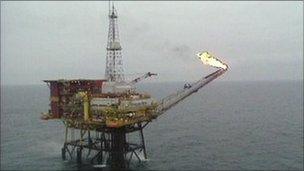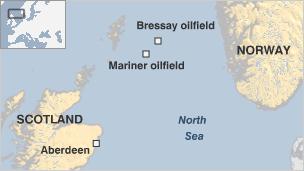Ministers not reversing North Sea tax hike after Budget
- Published

The industry claims tens of thousands of jobs in the UK could go as a result of the new tax
UK government ministers have said they will not reverse the Budget decision to raise North Sea oil taxes.
Industry heads are angry at the surprise windfall tax on North Sea profits announced by Chancellor George Osborne last week.
The move has "severely damaged investor confidence", according to Malcolm Webb, head of industry body Oil and Gas UK.
Ministers said they were still willing to hold further talks with North Sea oil companies.
It came after a meeting of the "Pilot" forum between representatives of the hydrocarbons industry and the government.
Mr Webb said: "The industry representatives had a full and frank discussion with the secretary of state for energy, secretary of state for Scotland, economic secretary to the treasury and energy minister.
"The meeting recognised the concerns arising out of the new measures in the Budget for gas fields, new field developments, decommissioning, mature fields, infrastructure and the supply chain.
"A meeting is to be arranged between industry and the chancellor of the exchequer."
It comes after two more companies joined Norway's Statoil in considering shelving North Sea investment projects.
Several firms have been increasing their pressure on the government.
British Gas-owner Centrica is understood to be reviewing its current and future developments, while Valiant Petroleum also said it had cancelled a project worth up to £93m.
The CBI employers' group also added to pressure on ministers over the affair.

Norway's Statoil is the majority investor and operator for the two North Sea heavy oil fields
John Cridland, CBI director-general, said: "It is not surprising that a number of companies are reconsidering plans for investment in the North Sea.
"The £2bn windfall tax is creating uncertainty for a sector which creates jobs and wealth for the economy, and already pays a significant amount of tax."
It comes after Norwegian company Statoil said on Tuesday that it had halted investments in two new oil and gas fields worth up to $10bn (£6.2bn).
The Mariner and Bressay fields, in which Statoil is the majority investor and operator, have combined reserves of 640 million barrels of oil.
Any cancellation of investment projects is likely to affect employment in the UK, particularly in Aberdeen, which hosts many oil companies and their suppliers.
"By impacting the investment opportunities for operators, it is inevitable that the supply chain will feel the effects and the jobs we work so hard to sustain could be jeopardised," said Bob Keiller, chief executive of oil services company PSN, which employs more than 2,500 people in the UK.
'Perfectly reasonable'
The chancellor has called the tax rise "perfectly reasonable" in light of rising oil prices, which would boost oil companies' profits.
He promised the Treasury Select Committee on Tuesday he would reverse the North Sea tax rise if the oil price falls below $75 per barrel for a sustained period.
Mr Osborne denied that Statoil was cancelling its investment, saying the firm "just want to talk to us about their investment plans".
But Statoil spokesman Baard Glad Pedersen said the tax hike could render the two oilfields economically non-viable.
They were first discovered 30 years ago, but were not developed until now because the heavy crude oil they contain is expensive to extract and commands a lower price in international markets, he said.
Statoil decided to develop the fields in 2007 at a time when the oil prices had risen substantially.
The oil price is even higher now, but Mr Pedersen says the company makes investment decisions based on a long-term price forecast that ignores short-term fluctuations such as the recent rise due to events in Libya.
He declined to tell the BBC what the long-term price forecast used was, and whether this was above or below the $75 threshold for the windfall tax promised by Mr Osborne.
Aberdeen rebels
Meanwhile, two Scottish Liberal Democrat MPs rebelled against the coalition government's North Sea tax hike when it came up for a vote in the Commons on Tuesday night.
Malcolm Bruce and Sir Robert Smith - both of whom represent constituencies in Aberdeenshire - voted against the measure.
"It's easy to look at the bottom line and say that they can afford [the tax]," said Mr Bruce, speaking to BBC Radio Scotland.
"What is not acceptable is the sudden and abrupt change," he added, claiming the government had broken a promise not to change the tax regime it made to one firm when it decided to invest in the North Sea.
But the government was "sitting down with oil companies on a field-by-field basis" to ensure that economically marginal investments were not pulled as a result of the tax decision, according to Conservative MP Mark Menzies.
The government won the vote by 334 to 13, with most Labour MPs abstaining, and only the Scottish National Party voting against as a bloc.
The SNP had no problem with oil and gas paying its proper share, according to MP Eilidh Whiteford, but the government needed to make sure it was not disincentivising companies that were sometimes making a risky investment decision.
Two Labour MPs, Anne Begg and Frank Doran - also from Aberdeen - opposed the measure.
Ms Begg accused the coalition government of having "plucked [the tax hike] out of thin air at the last minute" and said the consequences on the less profitable gas industry had not been thought through.
- Published24 March 2011
- Published23 March 2011